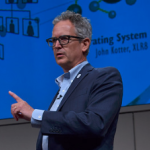Someone recently asked me what education will look like in the modern era. My response: Much like it has for the last 100 years. How's that for a pessimistic view of our education system?
It's not a pessimistic view as much as it is a pragmatic one. Anyone who spends time in schools could walk away feeling similarly, given that the ways we teach young people are stubbornly resistant to change. As schools in the United States begin a new year, most students are returning to classrooms where desks are lined-up in rows, the instructional environment is primarily teacher-centred, progress is measured by Carnegie units and A-F grading, and collaboration is often considered cheating.
Were we able to point to evidence that this industrialized model was producing the kind of results that are required, where every child is given the personal attention needed to grow a love of learning and develop the skills needed to thrive in today's innovation economy, then we could very well be satisfied with the status quo. But any honest and objective look at current metrics speaks to the need for fundamental change.
But my view isn't a pessimistic one. In fact, it's quite optimistic.
For as easy as it is to dwell on what's wrong with our current education model, I also know of example after example of where education stakeholders are willing to step out of what's comfortable and challenge this system that is so immune to change. Teachers are demanding more collaboration with peers and more ways to be open and transparent about prototyping ideas that lead to true innovation for students—not just repackaging of traditional methods with technology. Administrators are enabling deeper, more connected learning to real-world applications through community-focused, project-based learning—not just jumping through hoops of "doing projects" in isolated classrooms. And parents are demanding that the joy and wonder of learning return to the culture of their schools that have been corrupted by an emphasis on test prep.
These and other types of cultural changes are never easy, especially in an environment so reluctant to take risks in the face of political backlash from any dip in test scores (regardless of statistical significance). So why am I optimistic that we are approaching a tipping point where the type of changes we desperately need can indeed overcome the inertia that has thwarted them for too long?
Because there is something else in water at this point in our modern era that was not present before: an ethos of openness, catalyzed by digital technology.
Think for a moment: If you need to learn how to speak basic French for an upcoming trip to France, where do you turn? You could sign up for a course at a local community college or check out a book from the library, but in all likelihood, you'll access a free online video and learn the basics you will need for your trip. Never before in human history has free, on-demand learning been so accessible. In fact, one can sign up right now for a free, online course from MIT on "Special Topics in Mathematics with Applications: Linear Algebra and the Calculus of Variations." Sign me up!
Why do schools such as MIT, Stanford, and Harvard offer free access to their courses? Why are people and corporations willing to openly share what was once tightly controlled intellectual property? Why are people all over the planet willing to invest their time—for no pay—to help with citizen science projects?
In his wonderful book Open: How We'll Work Live and Learn in the Future, author David Price clearly describes how informal, social learning is becoming the new norm of learning, especially among young people accustomed to being able to get the "just in time" knowledge they need. Through a series of case studies, Price paints a clear picture of what happens when traditional institutions don't adapt to this new reality and thus become less and less relevant. That's the missing ingredient that has the crowdsourced power of creating positive disruption.
What Price points out (and what people are now demanding at a grassroots level) is nothing short of an open movement, one recognizing that open collaboration and free exchange of ideas have already disrupted ecosystems from music to software to publishing. And more than any top-down driven "reform," this expectation for openness has the potential to fundamentally alter an educational system that has resisted change for too long. In fact, one of the hallmarks of the open ethos is that it expects the transparent and fair democratization of knowledge for the benefit of all. So what better ecosystem for such an ethos to thrive than within the one that seeks to prepare young people to inherit the world and make it better?
Sure, the pessimist in me says that my earlier prediction about the future of education may indeed be the state of education in the short term future. But I am also very optimistic that this prediction will be proven to be dead wrong. I know that I and many other kindred-spirit educators are working every day to ensure that it's wrong. Won't you join me as we start a movement to help our schools transform into open organizations—to transition from from an outdated, legacy model to one that is more open, nimble, and responsive to the needs of every student and the communities in which they serve?
That's a true education model appropriate for the modern era.






2 Comments